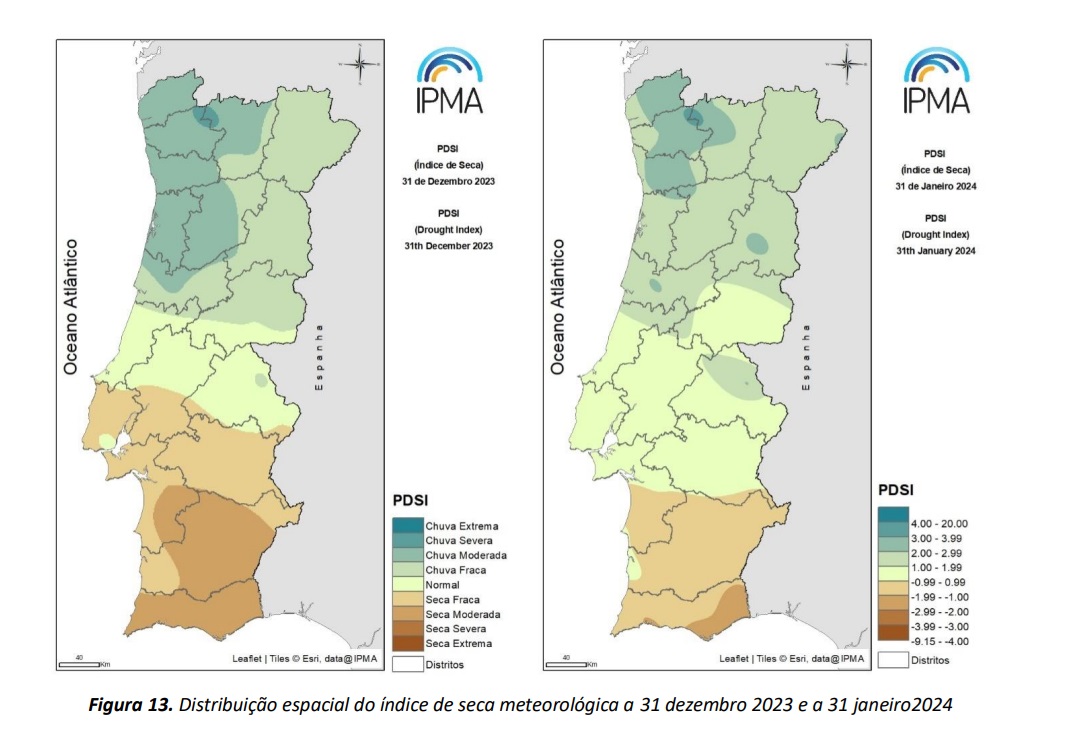January of this year was the 3rd hottest January ever in Portugal, with an average temperature of 11,25 ºC. Even so, it was also a rainy month, which made it possible to alleviate the drought in the Algarve a little.
According to the Portuguese Institute of the Sea and Atmosphere (IPMA), at the end of January «there was a decrease in the area and intensity of meteorological drought in the South region».
However, the Sotavento Algarvio still remains in the moderate drought class.
On January 31, 20% of the territory was in meteorological drought (weak 18% and moderate 2%).
Furthermore, January 2024 was the hottest ever recorded globally, with a global average temperature of 13.14°C, 0.70°C above the 1991-2020 average value.
The month is estimated to have been about 1.66°C warmer than the pre-industrial average of 1850-1900.
In Europe, the average value of the average air temperature was + 0.18°C higher than the average value 1991-2020. There was a marked contrast in average temperatures in January with temperature values well below the 1991-2020 average in the Nordic countries, to well above average in the southernmost regions of the continent for the fourth consecutive month.
Temperatures below -43.0 °C were recorded at the beginning of January in Lapland and it was the coldest January in Sweden in 25 years (for certain weather stations, it was even the lowest in a data record spanning over a hundred years). However, milder conditions at the end of the month meant that the monthly average was not extremely low in these regions.

Also in France and the United Kingdom there were significant variations during the month of January, with the end of the month recording high values for the season; the UK recorded its highest daily maximum temperature for January (provisional data). It is also worth highlighting the very high temperatures in the south of Spain, as well as in the Alps, where record high temperatures were recorded at altitude.
Regarding precipitation, in January, wetter than average conditions were recorded across much of Europe, with storms affecting northern and southwestern Europe.
Storm Hipólito and Storm Juan hit the Iberian Peninsula, Storm Irene hit Western and Central Europe and Storm Isha affected the United Kingdom and Ireland. Drier than average conditions were observed in southeast and northern Spain and the Maghreb, southern United Kingdom, Ireland, eastern Iceland, most of Scandinavia, parts of northwestern Russia and the eastern Balkans.
In mainland Portugal, the average value of the maximum air temperature, 15.48 °C, with an anomaly of +2.31 °C, was the highest since 1931, followed by 2022. The average value of the minimum air temperature, 7.03 °C, it was 2.42 °C higher than normal, being the 7th highest since 1931.
During the month, the following stand out: air temperature values lower than the monthly average in 2 periods from the 5th to the 12th and the 20th and 21st; air temperature values above the monthly average in 3 periods: 2 to 4, 14 to 18 and 22 to 31. In this last period there was the occurrence of a heat wave which, due to its spatial and temporal extension, can be considered the most significant observed in the month of January since 1941.
In relation to precipitation, a total of 123.4 mm was recorded, which corresponds to 118% of the average value for 1981-2010. During the month, precipitation was recorded in the first 20 days of the month, with the last 10 days being characterized by the absence of precipitation in most of the territory.



















Comments